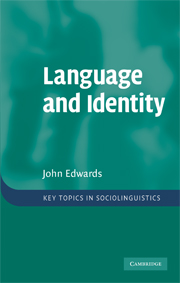Book contents
- Frontmatter
- Contents
- 1 Introduction
- 2 Identity, the individual and the group
- 3 Identifying ourselves
- 4 Language, dialect and identity
- 5 Dialect and identity: beyond standard and nonstandard
- 6 Language, religion and identity
- 7 Language, gender and identity
- 8 Ethnicity and nationalism
- 9 Assessments of nationalism
- 10 Language and nationalism
- 11 Language planning and language ecology
- Glossary
- Notes
- References
- Index
- References
5 - Dialect and identity: beyond standard and nonstandard
Published online by Cambridge University Press: 05 June 2012
- Frontmatter
- Contents
- 1 Introduction
- 2 Identity, the individual and the group
- 3 Identifying ourselves
- 4 Language, dialect and identity
- 5 Dialect and identity: beyond standard and nonstandard
- 6 Language, religion and identity
- 7 Language, gender and identity
- 8 Ethnicity and nationalism
- 9 Assessments of nationalism
- 10 Language and nationalism
- 11 Language planning and language ecology
- Glossary
- Notes
- References
- Index
- References
Summary
THE ‘LOGIC’ OF DIALECT
I noted earlier in this book that the linguistic evidence bearing upon the validity of all dialects was powerful: the term ‘substandard’ must be consigned to the dustbin, and no variety can be seen as more or less ‘correct’ than any other. In this chapter, I return to the relevant linguistic scholarship, in connection with the powerful ‘test case’ provided by Black English in America. I will also point to some further important aspects of dialect – and, hence, identity – evaluation.
Beginning in the 1960s, Labov's investigations of American Black English have remained compelling, and his two-volume overview (1994) provides an admirable summary of work on language variation and change, including replications of some of the early studies reported here. The language of inner-city black speakers was seen to make an excellent illustration of dialect validity in general, since it had for so long been rejected as inadequate by the white middle class, and since its speakers were victims of a prejudice that went well beyond language alone. If it could be shown that Black English were not some incorrect or debased variety, this would make a strong case for the linguistic integrity of all dialects. There were three central strands to Labov's work (for a fuller analysis of which, see Edwards, 1989).
- Type
- Chapter
- Information
- Language and IdentityAn introduction, pp. 73 - 98Publisher: Cambridge University PressPrint publication year: 2009



